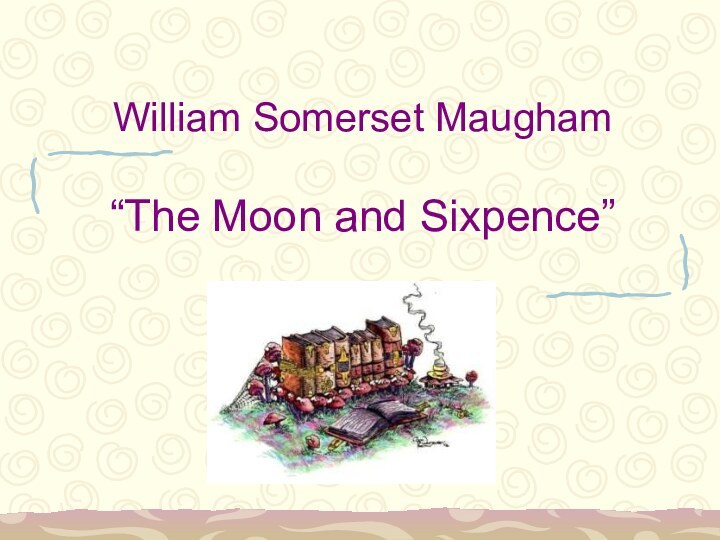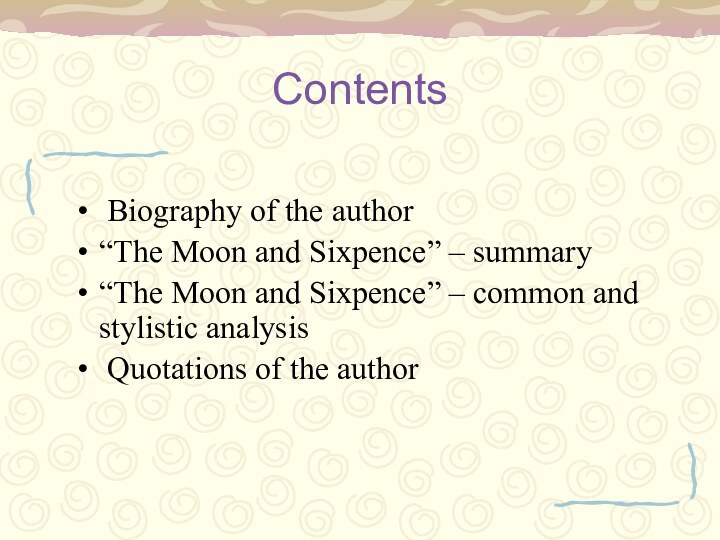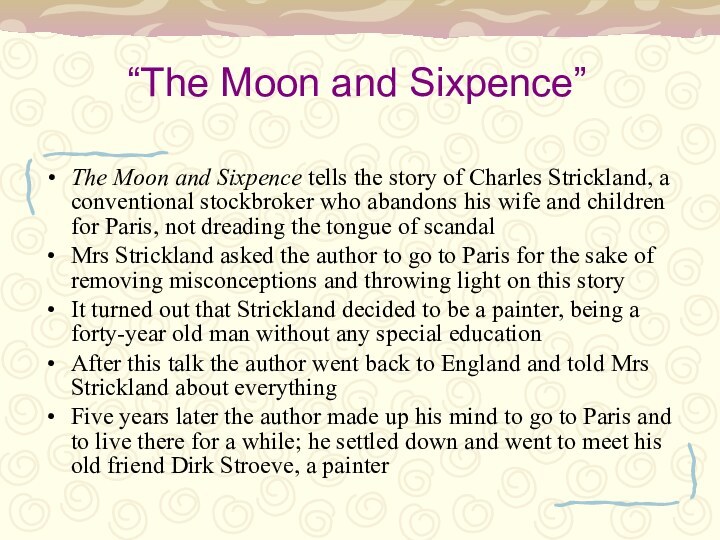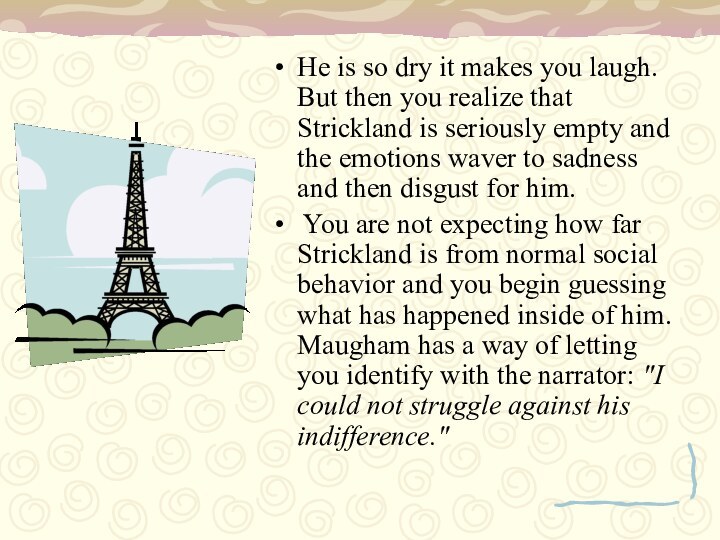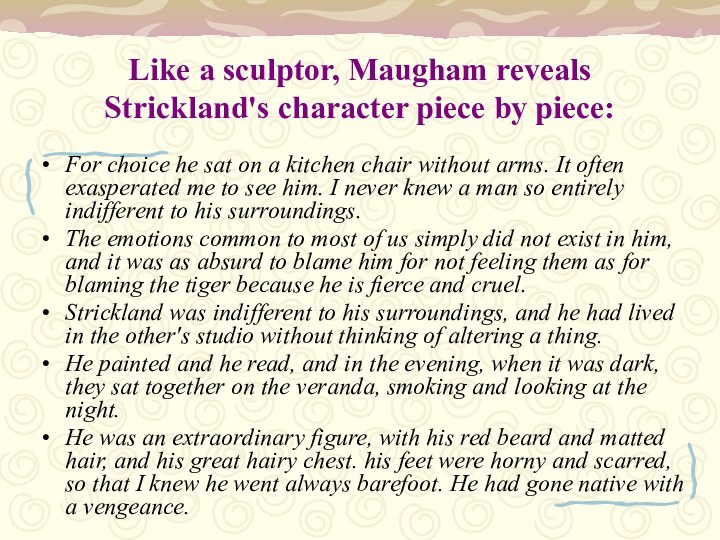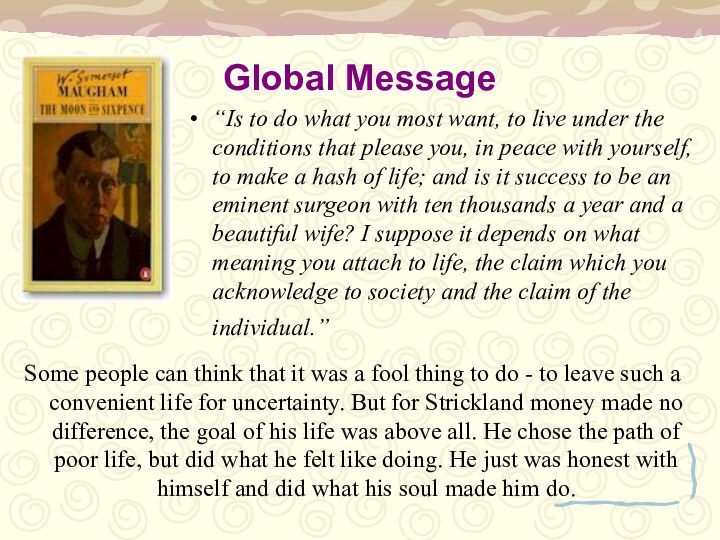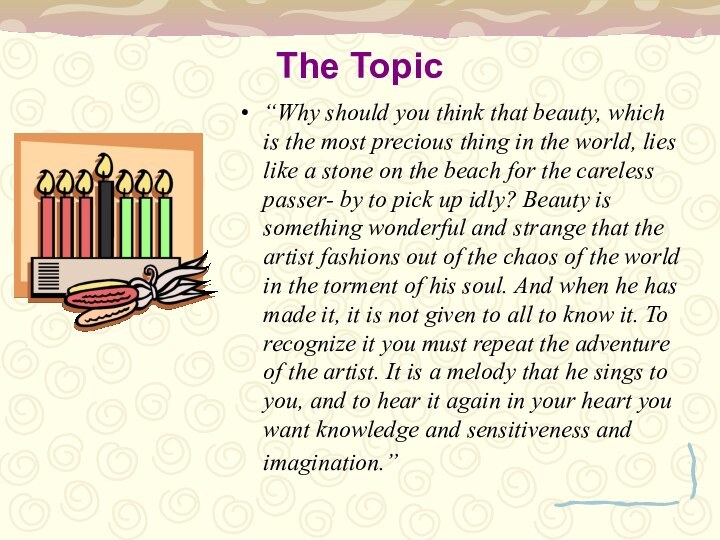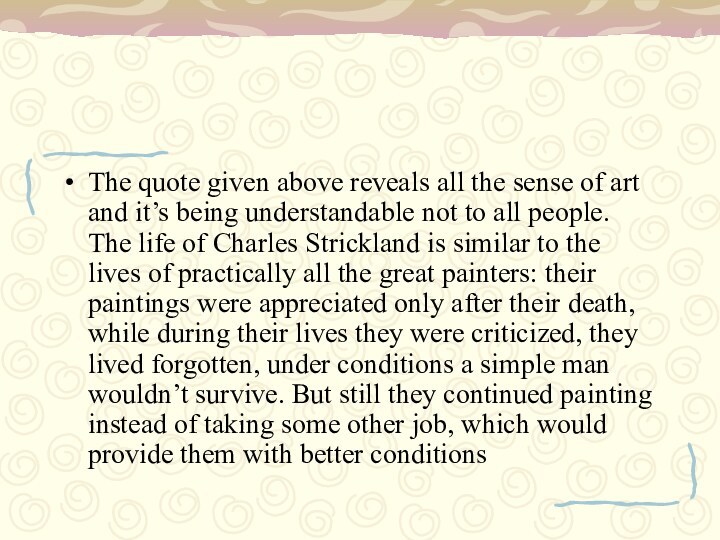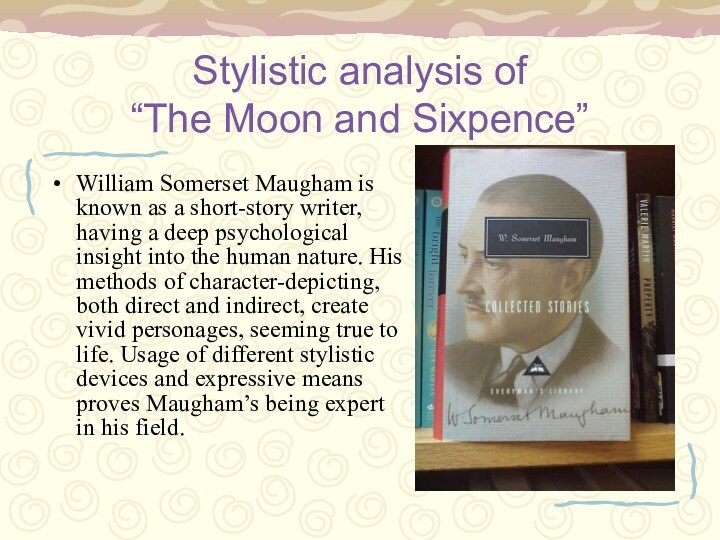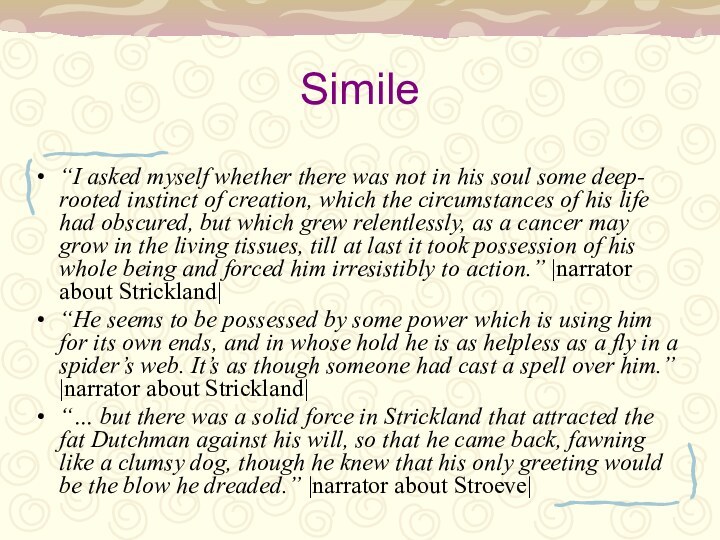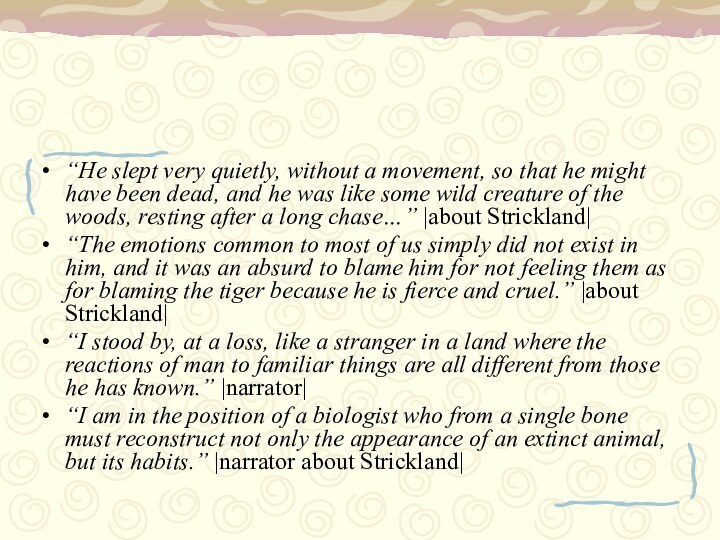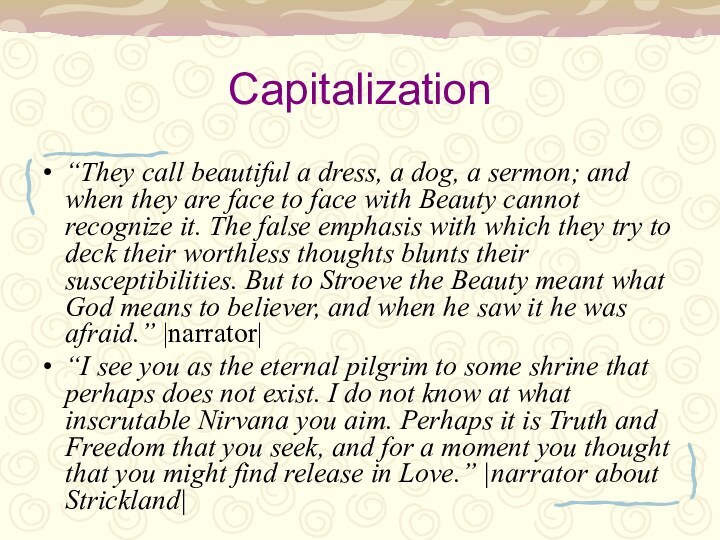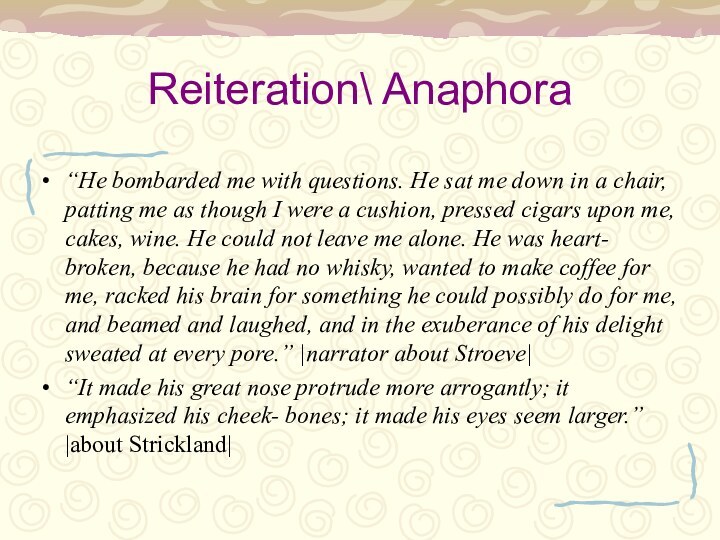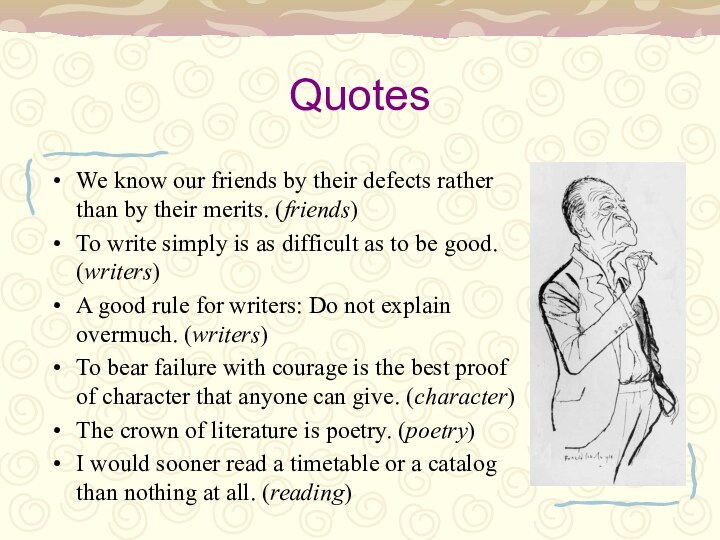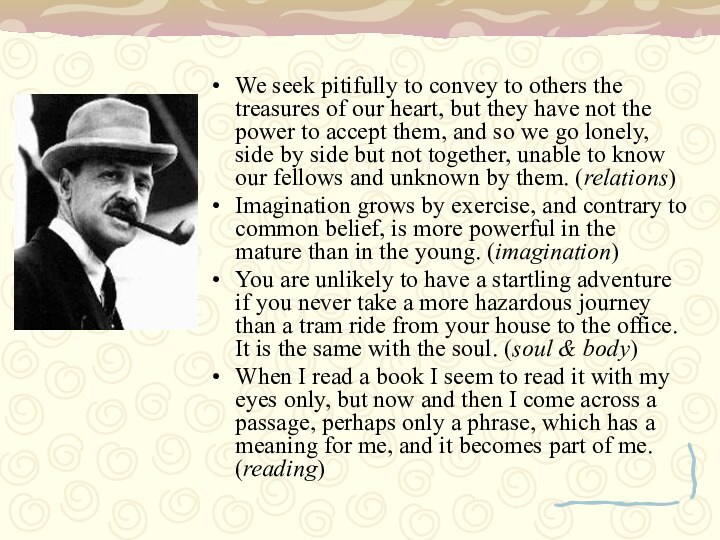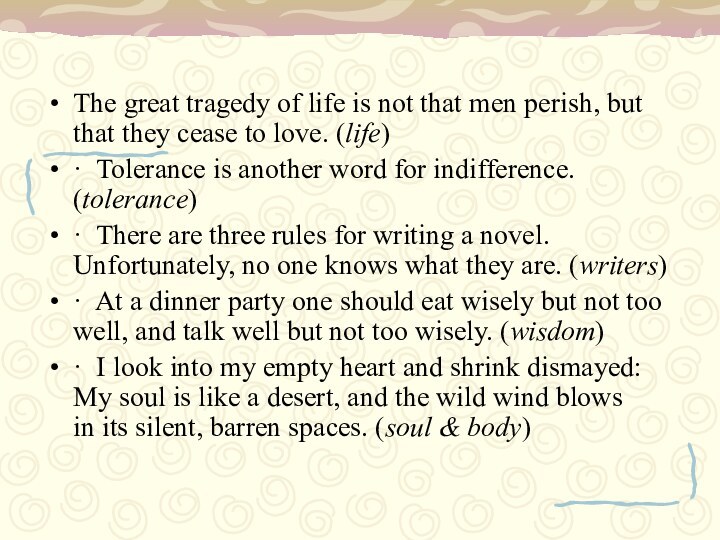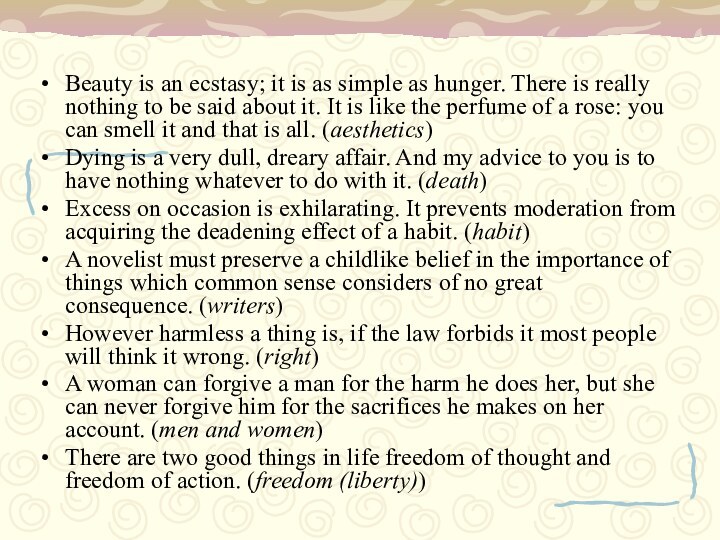Слайд 2
Contents
Biography of the author
“The Moon and
Sixpence” – summary
“The Moon and Sixpence” – common
and stylistic analysis
Quotations of the author
Слайд 3
William Somerset Maugham
25.01.1874 - 16.12.1965
Born in Paris,
in a family of a lawyer, who served in
a British embassy in France
Maugham spoke only French until at the age of 11 he lost his parents and moved to England, where his relatives lived
Before becoming a writer he studied literature, philosophy and medicine
William worked in a hospital of Saint Thomas, placed in a poor block of London; the experience found its reflection in the 1st novel
During World War I served as a spy and was sent to Russia
Слайд 4
After war continued writing; his work of a
scout was reflected in a collection of short stories
“Ashenden: or the British agent”
Maugham died in a small French town from pneumonia.
Слайд 5
The Moon and Sixpence tells the story of
Charles Strickland, a conventional stockbroker who abandons his wife
and children for Paris, not dreading the tongue of scandal
Mrs Strickland asked the author to go to Paris for the sake of removing misconceptions and throwing light on this story
It turned out that Strickland decided to be a painter, being a forty-year old man without any special education
After this talk the author went back to England and told Mrs Strickland about everything
Five years later the author made up his mind to go to Paris and to live there for a while; he settled down and went to meet his old friend Dirk Stroeve, a painter
“The Moon and Sixpence”
Слайд 6
Stroeve knew Strickland and his paintings, he worshipped
him, considering his paintings to be а sensation
Some time later Strickland got ill; Stroeve and the author brought Strickland to his house and Blanche Stroeve took care for him
Strickland and Blanch had a “love affair”
It all lead to her death, because she was willing to live with him, but he didn’t need her anymore after he’d got what he wanted
Some time later Strickland left for Marseilles
Слайд 7
After travelling a while the author came to
Tahiti, a lofty green island, where Strickland painted the
pictures on which his fame most securely rests and where he spent the rest of his life
Strickland was living a poor life, without money, job, food, when at last he found a shelter at her hotel. There he got acquainted with a native girl, Tiare’s relative, Ata
They married and went to the forest where Ata had a house; she bore two children
Then it turned out, that Strickland was ill with leprosy, he wanted to leave the family but Ata didn’t let him do it. Some time later his eyesight got worse, but he continued painting in spite of it
Слайд 8
Due to the fact that Ata couldn’t go
to the town and buy canvases to him he
used the walls of his house
Strickland got rid of some strong irresistible obsession imprisoning his soul with the help of those paintings
Soon he died. The most tragical thing in his death was the destroying of his masterpieces - burning of the house to prevent spreading of leprosy.
Слайд 9
“The Moon and Sixpence”
The Moon and Sixpence
(1919) is a short novel by William Somerset Maugham
based on the life of the painter Paul Gauguin. The story is told in episodic form by the first-person narrator as a series of glimpses into the mind and soul of the central character, Charles Strickland
The inspiration for this story, Paul Gauguin, is considered to be the founder of primitivism in art. The main differences between Gauguin and Strickland are that Gauguin was French rather than English, and whilst Maugham describes the character of Strickland as being ignorant of his contemporaries in Modern art, Gauguin himself was well acquainted with Van Gogh
Слайд 10
According to some sources, the title, meaning of
that is not explicitly revealed in the book, was
taken from a review of “Of Human Bondage” in which the novel's protagonist, Philip Carey, is described as "so busy yearning for the moon that he never saw the sixpence at his feet." Presumably Strickland's "moon" is the idealistic realm of Art and Beauty, while the "sixpence" represents human relationships and the ordinary pleasures of life.
Слайд 11
Describing Charles Strickland, Maugham begins with what is
a super ordinary man:
"He was null. He
was probably a worthy member of society, a good husband and father, an honest broker; but there was no reason to waste one's time over him…”
Maugham spends a certain amount of time describing the ordinariness of Strickland's life and character:
they would grow old insensibly
they would see their son and daughter come to years of reason, marry in due course…
and at last, prosperous in their dignified retirement, beloved by their descendants, after a happy, not unuseful life, in the fullness of their age they would sink into the grave.
Слайд 12
Thus we see Strickland's empty soul. And one
day Strickland just leaves. Something must have silently broken
inside of him to make him just move away. He has no more emotion, and Maugham spends the rest of the book expertly showing us this in contact after contact between the narrator and Strickland.
Слайд 13
In meeting after meeting, Strickland proves himself to
be nothing else but empty of normal response: "Then,
what in God's name have you left her for?" / "I want to paint.“
He "just wants to paint," which is an extremely mild way of putting that he needs to madly pursue a genius demon inside of him.
Strickland simply repeats, "I've got to paint" until finally he is confronted with "You are a most unmitigated cad" to which he replies, "Now that you've got that off your chest, let's go and have dinner."
Слайд 14
He is so dry it makes you laugh.
But then you realize that Strickland is seriously empty
and the emotions waver to sadness and then disgust for him.
You are not expecting how far Strickland is from normal social behavior and you begin guessing what has happened inside of him. Maugham has a way of letting you identify with the narrator: "I could not struggle against his indifference."
Слайд 15
The narrator continues to reason with Strickland, but
in vain, there is a no end to his
depth of indifference, he simply doesn't feel those feelings that others feel about social commitment and responsibility towards others:
“He seemed to express himself with difficulty, as though words were not the medium with which his mind worked; and you had to guess the intentions of his soul by hackneyed eyes, slang and vague, unfinished gestures.”
Слайд 16
Strickland becomes a paradox : "He was a
sensual man, and yet was indifferent to sensual things“
Yet
you begin to get a better picture of him from description to description : "He did not seem quite sane. It seemed to me that he would not show his pictures because he was really not interested in them. I had the idea that he seldom brought anything to completion, but the passion that fired him, he lost all care for it.“
The more possessed Strickland appears, the more you understand him.
Слайд 17
Like a sculptor, Maugham reveals Strickland's character piece
by piece:
For choice he sat on a kitchen chair
without arms. It often exasperated me to see him. I never knew a man so entirely indifferent to his surroundings.
The emotions common to most of us simply did not exist in him, and it was as absurd to blame him for not feeling them as for blaming the tiger because he is fierce and cruel.
Strickland was indifferent to his surroundings, and he had lived in the other's studio without thinking of altering a thing.
He painted and he read, and in the evening, when it was dark, they sat together on the veranda, smoking and looking at the night.
He was an extraordinary figure, with his red beard and matted hair, and his great hairy chest. his feet were horny and scarred, so that I knew he went always barefoot. He had gone native with a vengeance.
Слайд 18
Expressions, characterizing Strickland:
to tell smb to go to
the devil
she can go to hell
damn
not to really care
a twopenny damn about smth
to be a hysterical ass
to be a damned fool
U blasted fool etc.
He is not in the least concerned with other people’s feelings and their attitude toward him. He can speak in such a manner to anyone, who ever it might be. He also uses short unexpanded, elliptical sentences that make his speech very sharp and unfriendly.
Слайд 19
Global Message
“Is to do what you most want,
to live under the conditions that please you, in
peace with yourself, to make a hash of life; and is it success to be an eminent surgeon with ten thousands a year and a beautiful wife? I suppose it depends on what meaning you attach to life, the claim which you acknowledge to society and the claim of the individual.”
Some people can think that it was a fool thing to do - to leave such a convenient life for uncertainty. But for Strickland money made no difference, the goal of his life was above all. He chose the path of poor life, but did what he felt like doing. He just was honest with himself and did what his soul made him do.
Слайд 20
The Topic
“Why should you think that beauty, which
is the most precious thing in the world, lies
like a stone on the beach for the careless passer- by to pick up idly? Beauty is something wonderful and strange that the artist fashions out of the chaos of the world in the torment of his soul. And when he has made it, it is not given to all to know it. To recognize it you must repeat the adventure of the artist. It is a melody that he sings to you, and to hear it again in your heart you want knowledge and sensitiveness and imagination.”
Слайд 21
The quote given above reveals all the sense
of art and it’s being understandable not to all
people. The life of Charles Strickland is similar to the lives of practically all the great painters: their paintings were appreciated only after their death, while during their lives they were criticized, they lived forgotten, under conditions a simple man wouldn’t survive. But still they continued painting instead of taking some other job, which would provide them with better conditions
Слайд 22
Stylistic analysis of
“The Moon and Sixpence”
William
Somerset Maugham is known as a short-story writer, having
a deep psychological insight into the human nature. His methods of character-depicting, both direct and indirect, create vivid personages, seeming true to life. Usage of different stylistic devices and expressive means proves Maugham’s being expert in his field.
Слайд 23
Metaphor
“When a man falls into the water it
doesn’t matter how he swims, well or badly: he’s
got to get out or else he’ll drown.” |Strickland|
“Only the poet or the saint can water an asphalt pavement in the confident anticipation that lilies will reward his labour.” |narrator|
“It’s the policeman in our hearts, set there to watch that we do not break its laws. It’s the spy seated in the central stronghold of the ego.” |narrator|
“He played with taste, but with more feeling that was always justified, and into his music poured all his honest, sentimental, exuberant soul.” |about Dirk Stroeve|
Слайд 24
“His life was strangely divorced from material things,
and it was as though his body at times
wreaked a fearful revenge on his spirit.” |about Strickland|
“The soul of man wanders through the uttermost regions of the universe, and woman seeks to imprison it in the circle of her account- book.” |Strickland|
“Grey clouds chased one another across the sky.” |narrator|
“You have no more spirit than a mongrel cur. You lie down on the ground and ask people to trample on you.” |Strickland about Stroeve|
Слайд 25
Simile
“I asked myself whether there was not in
his soul some deep- rooted instinct of creation, which
the circumstances of his life had obscured, but which grew relentlessly, as a cancer may grow in the living tissues, till at last it took possession of his whole being and forced him irresistibly to action.” |narrator about Strickland|
“He seems to be possessed by some power which is using him for its own ends, and in whose hold he is as helpless as a fly in a spider’s web. It’s as though someone had cast a spell over him.” |narrator about Strickland|
“… but there was a solid force in Strickland that attracted the fat Dutchman against his will, so that he came back, fawning like a clumsy dog, though he knew that his only greeting would be the blow he dreaded.” |narrator about Stroeve|
Слайд 26
“He slept very quietly, without a movement, so
that he might have been dead, and he was
like some wild creature of the woods, resting after a long chase…” |about Strickland|
“The emotions common to most of us simply did not exist in him, and it was an absurd to blame him for not feeling them as for blaming the tiger because he is fierce and cruel.” |about Strickland|
“I stood by, at a loss, like a stranger in a land where the reactions of man to familiar things are all different from those he has known.” |narrator|
“I am in the position of a biologist who from a single bone must reconstruct not only the appearance of an extinct animal, but its habits.” |narrator about Strickland|
Слайд 27
Exaggeration
“You have no more spirit than a mongrel
cur. You lie down on the ground and ask
people to trample on you.” |Strickland about Stroeve|
“They spoke in the native language, of which I had learnt but half a dozen words, and it sounded as though the world would shortly come to an end.” |narrator|
Слайд 28
Personification
“We must go through life so inconspicuously that
Fate does not notice us.” |Dirk Stroeve|
“What a cruel
practical joke old Nature played when she flung so many contradictory elements together, and left the man to face with the perplexing callousness of the universe.” |about Stroeve|
Слайд 29
Capitalization
“They call beautiful a dress, a dog, a
sermon; and when they are face to face with
Beauty cannot recognize it. The false emphasis with which they try to deck their worthless thoughts blunts their susceptibilities. But to Stroeve the Beauty meant what God means to believer, and when he saw it he was afraid.” |narrator|
“I see you as the eternal pilgrim to some shrine that perhaps does not exist. I do not know at what inscrutable Nirvana you aim. Perhaps it is Truth and Freedom that you seek, and for a moment you thought that you might find release in Love.” |narrator about Strickland|
Слайд 30
Reiteration\ Anaphora
“He bombarded me with questions. He sat
me down in a chair, patting me as though
I were a cushion, pressed cigars upon me, cakes, wine. He could not leave me alone. He was heart- broken, because he had no whisky, wanted to make coffee for me, racked his brain for something he could possibly do for me, and beamed and laughed, and in the exuberance of his delight sweated at every pore.” |narrator about Stroeve|
“It made his great nose protrude more arrogantly; it emphasized his cheek- bones; it made his eyes seem larger.” |about Strickland|
Слайд 31
“Then he told me, in a trembling voice,
with the tears pouring down his cheeks, how he
had gone up to her, trying to take her in his arms, but she had drawn away and begged him not to touch her. He implored her not to leave him. He told her how passionately he loved her, and reminded her of all the devotion he had lavished upon her. He spoke to her of the happiness of their life. He was not angry with her. He did not reproach her.” |about Dirk Stroeve|
Слайд 32
Quotes
We know our friends by their defects
rather than by their merits. (friends)
To write simply
is as difficult as to be good. (writers)
A good rule for writers: Do not explain overmuch. (writers)
To bear failure with courage is the best proof of character that anyone can give. (character)
The crown of literature is poetry. (poetry)
I would sooner read a timetable or a catalog than nothing at all. (reading)
Слайд 33
We seek pitifully to convey to others the
treasures of our heart, but they have not the
power to accept them, and so we go lonely, side by side but not together, unable to know our fellows and unknown by them. (relations)
Imagination grows by exercise, and contrary to common belief, is more powerful in the mature than in the young. (imagination)
You are unlikely to have a startling adventure if you never take a more hazardous journey than a tram ride from your house to the office. It is the same with the soul. (soul & body)
When I read a book I seem to read it with my eyes only, but now and then I come across a passage, perhaps only a phrase, which has a meaning for me, and it becomes part of me. (reading)
Слайд 34
The great tragedy of life is not that
men perish, but that they cease to love. (life)
· Tolerance is another word for indifference. (tolerance)
· There are three rules for writing a novel. Unfortunately, no one knows what they are. (writers)
· At a dinner party one should eat wisely but not too well, and talk well but not too wisely. (wisdom)
· I look into my empty heart and shrink dismayed:
My soul is like a desert, and the wild wind blows
in its silent, barren spaces. (soul & body)
Слайд 35
Beauty is an ecstasy; it is as simple
as hunger. There is really nothing to be said
about it. It is like the perfume of a rose: you can smell it and that is all. (aesthetics)
Dying is a very dull, dreary affair. And my advice to you is to have nothing whatever to do with it. (death)
Excess on occasion is exhilarating. It prevents moderation from acquiring the deadening effect of a habit. (habit)
A novelist must preserve a childlike belief in the importance of things which common sense considers of no great consequence. (writers)
However harmless a thing is, if the law forbids it most people will think it wrong. (right)
A woman can forgive a man for the harm he does her, but she can never forgive him for the sacrifices he makes on her account. (men and women)
There are two good things in life freedom of thought and freedom of action. (freedom (liberty))
